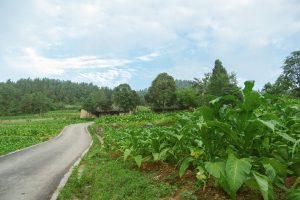Not sure if or Is Tobacco Farming Profitable In Kenya? Well, Tobacco farming in Kenya can be profitable, with potential earnings ranging from 200,000 to 400,000 Kenyan Shillings (KES) per acre annually, which is equivalent to approximately $2,000 to $4,000 in US dollars (USD).
In a country known for its rich agricultural heritage, Kenya stands as one of the leading agricultural producers in East Africa.
While maize, sugarcane, tea, and coffee have traditionally been the mainstays of Kenyan agriculture, another crop has emerged as a topic of increasing interest and debate: tobacco.
This article explores the profitability of tobacco farming in Kenya, shedding light on the opportunities and challenges faced by those engaged in this controversial industry.
Is Tobacco Farming Profitable In Kenya?
The Tobacco Industry in Kenya
The tobacco industry in Kenya has grown steadily, with both domestic consumption and exports contributing to its expansion. Kenyan tobacco is primarily used in the production of cigarettes, making it a critical player in the global tobacco market. However, the profitability of this industry is contingent on several key factors.
Factors Influencing Profitability
Climate and Soil Conditions
Kenya’s diverse climate and soil conditions make it suitable for tobacco cultivation. Different regions offer varying advantages, allowing farmers to select the most favorable environment for their crops.
Market Demand
Global demand for tobacco products remains robust, ensuring a consistent market for Kenyan tobacco. However, shifts in consumer preferences and increased awareness of health risks pose challenges to the industry.
Government Regulations
Stringent regulations and taxes imposed on tobacco products in Kenya can impact profitability. Farmers must navigate a complex regulatory landscape to remain competitive.
Costs and Investments
Land and Equipment
Investing in the right land and equipment is crucial for tobacco farming. The initial capital outlay can be substantial, affecting the overall profitability of the venture.
Labor
Tobacco farming requires a significant labor force, especially during planting and harvesting seasons. Labor costs are a substantial part of the overall expenses.
Inputs and Chemicals
To ensure a healthy and productive crop, farmers must invest in quality inputs and chemicals. This includes fertilizers, pesticides, and disease control measures.
Yield and Crop Management
Crop Varieties
Selecting the right tobacco varieties is essential for high yields and quality. Farmers need to stay updated on the latest strains and hybrids available.
Pest and Disease Control
Tobacco plants are susceptible to various pests and diseases. Effective management strategies are vital to prevent losses.
Marketing and Sales
Local vs. International Markets
Farmers have the option to sell their tobacco locally or explore international markets. Understanding market dynamics is crucial for maximizing profits.
Pricing Strategies
Determining the right pricing strategy can significantly impact profitability. Factors like quality and market demand play a pivotal role.
Sustainability and Environmental Concerns
The environmental impact of tobacco farming is a growing concern. Sustainable farming practices can help mitigate the negative effects on the environment and promote long-term profitability.
Challenges Faced by Tobacco Farmers
Tobacco farming in Kenya is not without its challenges. Issues such as fluctuating market prices, climate change, and health concerns pose significant obstacles for farmers.
Is Tobacco Farming Profitable?
The profitability of tobacco farming in Kenya is influenced by a complex interplay of factors. While it can be a lucrative venture for some, the risks and ethical considerations should not be ignored.
Case Studies
Exploring real-world examples of tobacco farming in Kenya can provide valuable insights into the industry’s profitability.
Success Stories
Some Kenyan tobacco farmers have achieved remarkable success by implementing innovative strategies and sustainable practices.
The Future of Tobacco Farming in Kenya
As the world evolves, so does the tobacco industry in Kenya. The future of tobacco farming will be shaped by changes in consumer preferences, regulations, and sustainability efforts.
Is Tobacco Farming Profitable In Kenya?FAQs
14.1 Is tobacco farming legal in Kenya?
Yes, tobacco farming is legal in Kenya. However, it is subject to strict regulations and taxes imposed by the government.
14.2 What are the major challenges faced by tobacco farmers in Kenya?
Tobacco farmers in Kenya face challenges such as fluctuating market prices, climate change, and health concerns associated with tobacco production.
14.3 How does Kenya’s tobacco industry compare to other African countries?
Kenya’s tobacco industry is significant in Africa, with both domestic consumption and exports playing a crucial role in the global tobacco market.
14.4 Are there any alternative crops for Kenyan farmers to consider?
Yes, Kenyan farmers have alternatives like maize, sugarcane, tea, and coffee. These crops also have the potential for profitability.
14.5 What steps can be taken to make tobacco farming more sustainable in Kenya?
To make tobacco farming more sustainable in Kenya, farmers can adopt eco-friendly practices, reduce chemical use, and explore crop rotation options.
Conclusion
Tobacco farming in Kenya is a multifaceted industry with both opportunities and challenges. Its profitability depends on a range of factors, from market demand to sustainable practices. Farmers considering tobacco cultivation must weigh the financial rewards against the ethical and environmental implications.
Recent Posts
Europe’s GPU market offers a wide range of high‑performance graphics cards tailored to gamers, creators, and professionals. Choosing the right GPU to buy in Europe depends on your budget,...
Top Semiconductor Companies In Europe – Field-Tested Choices
Europe has a long history in semiconductor innovation, producing advanced chips for automotive, industrial, and consumer electronics. The region’s strong engineering talent and research...